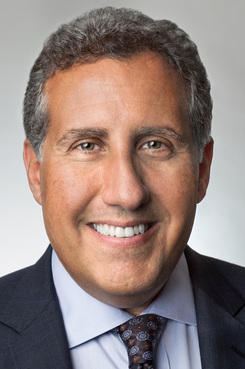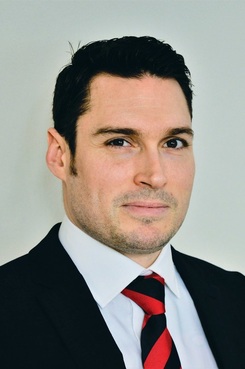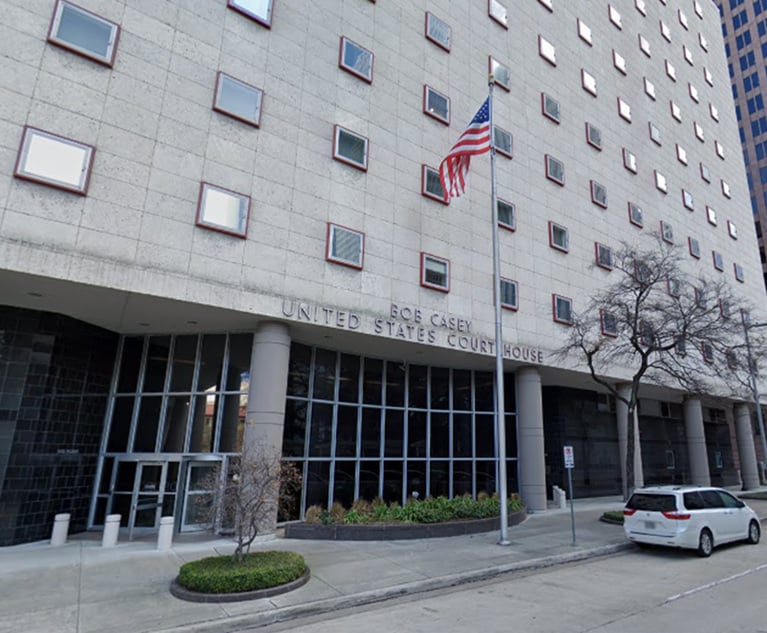As Capital Pours In, a Litigation Funding Icon Changes Its Strategy
Howard Shams is readying Parabellum Capital for a day when litigation finance becomes “commoditized.”
September 25, 2018 at 02:53 PM
7 minute read

One of the first times Howard Shams asked a law firm about financing some of its litigation, its partners were reluctant to talk about the case he liked. Instead, the lawyers pushed toward him a case they knew had a much lower chance of success.
“I said, 'That's so adverse selective,'” said Shams, recalling an episode from his days at Credit Suisse AG, where he ran one of the financial services firm's earliest books investing in litigation. “They were not even embarrassed by it.”
Flash forward roughly a decade, and Shams is readying himself and his firm, Parabellum Capital, for what he sees as a new adverse selection problem bubbling up in his industry.
Simply put, at some point, there will be too much money looking to invest in too few cases.
Litigation funding has never been more en vogue to the investor class. Major funders in the United States have announced raising $1.75 billion over the past two years. Since the start of 2017, at least eight entities have raised more than $100 million to invest in litigation. There were three capital raises of that size in the three years prior.
 Howard Shams.
Howard Shams.Shams is one of the few litigation funding insiders who said he is preparing for a market where this growth will eventually lead to “commoditized” capital in the litigation finance space. In other words, a time when funders are competing on price or on deal terms in order to invest in profitable cases. As a result, the outsize returns that funders have enjoyed—often demanding three to six times their investments—will shrink.
“When everybody is looking [to invest in] a limited number of cases, you have to figure out how you're not going to be involved in a bidding war with someone who's going to do stupid things because they've got to deploy capital,” Shams said in a recent interview with The American Lawyer.
His solution is what Shams calls a “pivot toward clients,” or towards marketing his money toward companies.
Shams wants to displace law firm partners as corporations' go-to source for hiring litigators. By hiring law firms through Parabellum, argued Shams, clients will get deals that maximize their potential returns and they will work with the best firms for plaintiffs work. Parabellum, meanwhile, will get a first look at the best cases.
“What we're messaging to the market is not that there is commoditized capital today, but that the growth [in litigation finance] has to be inside great risk-taking law firms, of which there are candidly a limited amount, and it has to be, two, inside claimholders themselves,” Shams said.
Shams and Parabellum are far from the lone litigation funder who are marketing their services directly to blue-chip companies and other corporations.
Burford Capital Ltd. announced in 2016 that it had invested $45 million in a portfolio of cases pursued by one company, which news reports later pegged as U.K. telecommunications giant BT Group plc. But deals that are sourced directly from companies are otherwise hard to find, owing to the secrecy of the industry.
Still, nearly all the biggest players in the industry such as IMF Bentham Ltd., Longford Capital Management and Validity Finance have all expressed a desire to source deals directly from companies. Ralph Sutton, a former colleague of Shams at Credit Suisse who launched Validity Finance earlier this year, said he believes growth in the industry will be determined by who provides the best experience for claimholders.
 Ralph Sutton
Ralph Sutton“The third wave of growth [in litigation finance] is focused on the clients and creating value for them,” Sutton said. “And that's what we need to focus on: Who are the funders who put the clients first.”
At a presentation in New York this summer, William Strong, chairman of Longford Capital, said that the future of litigation finance would include funding an “increasing number of corporate portfolios.”
Still, what is different about Shams' messaging is his blunt assessment that the industry will at some point reach a level of capital that will force returns lower. Most litigation finance leaders do not agree, or at least not publicly.
“Over time, eventually, there may be some downward price pressure,” Sutton said. “But it's still so early.”
Christopher Bogart, CEO of Burford Capital, said the effect increased levels of capital has on the pricing of litigation funding is “widely misunderstood in the industry.” Pricing of the cases must be based on their underlying risk, he said.
“The dynamic is not one of saying, 'Gee, there are more people doing this now so for the same risk the price should be lower,'” Bogart said. “All that does is guarantee you that you won't generate the returns that will get you the capital.”
Shams also believes that corporations hiring law firms through a litigation funder will ensure that clients are working with firms that understand how to staff and pursue plaintiffs-side litigation. Most Big Law litigation departments are much more accustomed to billing hours on defense cases. And from the funders' perspective, it ensures that Parabellum will work with firms who are investing in their clients' cases rather than using litigation finance to extend a billable hour model, Shams said.
“When law firms are thinking, 'How can I act like I'm on the billable hour even though I'm technically working on contingency fee?' I call that adverse selection. I call that misalignment. I call that a bad situation,” Shams said. “We anticipate that the law firms who are really great practitioners of plaintiffs work are different than those out there looking to get their piece of some cheap capital.”
There is still a question of whether blue-chip companies are ready to engage litigation funders as a one-stop shop for financing their cases and hiring their lawyers.
On that point, most in the industry believe the transition will take time.
 James Blick.
James Blick.James Blick, who heads the U.S. operations of litigation finance broker The Judge Group Inc., said corporations are “gradually” warming up to the idea of striking deals directly with finance firms.
“I think the uptake there is definitely lower than what the funders would like to see,” Blick said.
Charles Agee, CEO of broker Westfleet Advisors, said, “How much traction funders are getting from those outreach efforts remains to be seen, but it's happening,”
Shams, too, admits that the transition will take time. But he is betting that now is the time to begin his messaging to corporate clients.
“At some point you'll say the world is full-up on cases and capital,” Shams said. “We believe that while that conversation is still a ways off, it can't be ignored. And that the natural extension of our business is to corporations who will start to think differently about their legal assets.”
Related stories:
Litigation Funders Face Their Hardest Sell: Big Law
A New Litigation Funding Firm Launches With an Industry Veteran
This content has been archived. It is available through our partners, LexisNexis® and Bloomberg Law.
To view this content, please continue to their sites.
Not a Lexis Subscriber?
Subscribe Now
Not a Bloomberg Law Subscriber?
Subscribe Now
NOT FOR REPRINT
© 2025 ALM Global, LLC, All Rights Reserved. Request academic re-use from www.copyright.com. All other uses, submit a request to [email protected]. For more information visit Asset & Logo Licensing.
You Might Like
View All
Law Firms Expand Scope of Immigration Expertise Amid Blitz of Trump Orders
6 minute read

Am Law 100 Lateral Partner Hiring Rose in 2024: Report

JCPenney Seeks Return of More Than $1.1M From Jackson Walker For Bankruptcy Work
3 minute readTrending Stories
- 1Uber Files RICO Suit Against Plaintiff-Side Firms Alleging Fraudulent Injury Claims
- 2The Law Firm Disrupted: Scrutinizing the Elephant More Than the Mouse
- 3Inherent Diminished Value Damages Unavailable to 3rd-Party Claimants, Court Says
- 4Pa. Defense Firm Sued by Client Over Ex-Eagles Player's $43.5M Med Mal Win
- 5Losses Mount at Morris Manning, but Departing Ex-Chair Stays Bullish About His Old Firm's Future
Who Got The Work
J. Brugh Lower of Gibbons has entered an appearance for industrial equipment supplier Devco Corporation in a pending trademark infringement lawsuit. The suit, accusing the defendant of selling knock-off Graco products, was filed Dec. 18 in New Jersey District Court by Rivkin Radler on behalf of Graco Inc. and Graco Minnesota. The case, assigned to U.S. District Judge Zahid N. Quraishi, is 3:24-cv-11294, Graco Inc. et al v. Devco Corporation.
Who Got The Work
Rebecca Maller-Stein and Kent A. Yalowitz of Arnold & Porter Kaye Scholer have entered their appearances for Hanaco Venture Capital and its executives, Lior Prosor and David Frankel, in a pending securities lawsuit. The action, filed on Dec. 24 in New York Southern District Court by Zell, Aron & Co. on behalf of Goldeneye Advisors, accuses the defendants of negligently and fraudulently managing the plaintiff's $1 million investment. The case, assigned to U.S. District Judge Vernon S. Broderick, is 1:24-cv-09918, Goldeneye Advisors, LLC v. Hanaco Venture Capital, Ltd. et al.
Who Got The Work
Attorneys from A&O Shearman has stepped in as defense counsel for Toronto-Dominion Bank and other defendants in a pending securities class action. The suit, filed Dec. 11 in New York Southern District Court by Bleichmar Fonti & Auld, accuses the defendants of concealing the bank's 'pervasive' deficiencies in regards to its compliance with the Bank Secrecy Act and the quality of its anti-money laundering controls. The case, assigned to U.S. District Judge Arun Subramanian, is 1:24-cv-09445, Gonzalez v. The Toronto-Dominion Bank et al.
Who Got The Work
Crown Castle International, a Pennsylvania company providing shared communications infrastructure, has turned to Luke D. Wolf of Gordon Rees Scully Mansukhani to fend off a pending breach-of-contract lawsuit. The court action, filed Nov. 25 in Michigan Eastern District Court by Hooper Hathaway PC on behalf of The Town Residences LLC, accuses Crown Castle of failing to transfer approximately $30,000 in utility payments from T-Mobile in breach of a roof-top lease and assignment agreement. The case, assigned to U.S. District Judge Susan K. Declercq, is 2:24-cv-13131, The Town Residences LLC v. T-Mobile US, Inc. et al.
Who Got The Work
Wilfred P. Coronato and Daniel M. Schwartz of McCarter & English have stepped in as defense counsel to Electrolux Home Products Inc. in a pending product liability lawsuit. The court action, filed Nov. 26 in New York Eastern District Court by Poulos Lopiccolo PC and Nagel Rice LLP on behalf of David Stern, alleges that the defendant's refrigerators’ drawers and shelving repeatedly break and fall apart within months after purchase. The case, assigned to U.S. District Judge Joan M. Azrack, is 2:24-cv-08204, Stern v. Electrolux Home Products, Inc.
Featured Firms
Law Offices of Gary Martin Hays & Associates, P.C.
(470) 294-1674
Law Offices of Mark E. Salomone
(857) 444-6468
Smith & Hassler
(713) 739-1250










